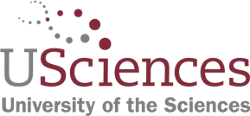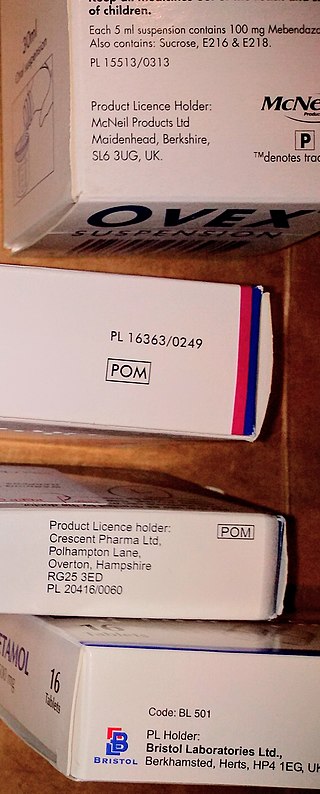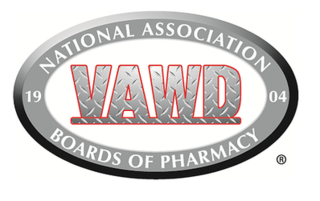
A pharmacist, also known as a chemist in Commonwealth English, is a healthcare professional who is knowledgeable about preparation, mechanism of action, clinical usage and legislation of medications in order to dispense them safely to the public and to provide consultancy services. A pharmacist also often serves as a primary care provider in the community and offers services, such as health screenings and immunizations.

University of the Sciences in Philadelphia, previously Philadelphia College of Pharmacy and Science (PCPS), was a private university in Philadelphia, Pennsylvania. On June 1, 2022, it officially merged into Saint Joseph's University.

A prescription drug is a pharmaceutical drug that is permitted to be dispensed only to those with a medical prescription. In contrast, over-the-counter drugs can be obtained without a prescription. The reason for this difference in substance control is the potential scope of misuse, from drug abuse to practicing medicine without a license and without sufficient education. Different jurisdictions have different definitions of what constitutes a prescription drug.
The North American Pharmacist Licensure Examination (NAPLEX) is a standard examination created by the National Association of Boards of Pharmacy (NABP) to help individual state boards of pharmacy assess an individual's competency and knowledge so that they may be given a license to practice. The NABP has announced that as of November 2016, the fee to take the exam, the number of exam questions, and the time to sit for the exam have all increased.
A Doctor of Pharmacy is a professional doctorate in pharmacy. In some countries, it is a proficient graduate degree to practice the profession of pharmacy or to become a clinical pharmacist. In many countries, people with their Doctor of Pharmacy are allowed to practice independently and can prescribe drugs directly to patients. A PharmD program has significant experiential and/or clinical education components in introductory and advanced levels for the safe and effective use of drugs. Experiential education prepares graduates to be practice-ready, as they already have spent a significant amount of time training in areas of direct patient care and research.

A pharmacy technician (PhT) performs pharmacy-related functions including but not limited to filling out prescription medications. Training, certification, licensing, and actual practice of pharmacy technicians varies not only worldwide but in some countries regionally as well as by employer.
The Multistate Pharmacy Jurisprudence Examination (MPJE) is a pharmacy law examination created by the National Association of Boards of Pharmacy (NABP) in the United States to help individual state boards of pharmacy assess the competency and knowledge of pharmacy law. It is required as a prerequisite for a pharmacy license by 48 states and the District of Columbia. Arkansas, California, and Idaho utilize state administered examinations.
An online pharmacy, internet pharmacy, or mail-order pharmacy is a pharmacy that operates over the Internet and sends orders to customers through mail, shipping companies, or online pharmacy web portal.

The Appalachian College of Pharmacy (ACP), formerly known as the University of Appalachia, College of Pharmacy, is a private doctoral pharmacy school located in Oakwood, Virginia. The school, established in 2003, is Virginia's only three-year accelerated Doctor of Pharmacy program. ACP's mission is to improve the health outcomes of rural and underserved communities, particularly those in Central Appalachia, through education, service, and scholarship.
A veterinary pharmacist is a specially trained pharmacist who dispenses veterinary drugs and supplies or products and advice to owners of companion animals and livestock. In addition, they advise the regulatory bodies and are involved in the formulation of veterinary drugs. Veterinary pharmacy is a field of pharmacy practice, in which veterinary pharmacists may compound medications, fill prescriptions, and manage drug therapies for animals. Veterinary pharmacists are licensed pharmacists who specialize in the distribution of medications for animals.
Pharmacy residency is education a pharmacist can pursue beyond the degree required for licensing as a pharmacist. A pharmacy residency program allows for the implementation of skill set and knowledge acquired in pharmacy school through interaction with the public either in a hospital setting or community practice. The program is done over a span of about 2yrs after graduation from pharmacy school and licensure as a pharmacist. Pharmacy residency helps improve the resume of a pharmacist so as to increase chances of obtaining employment outside community practice. A 2022 review suggested that there is sufficient evidence that residency develops key competencies for junior pharmacists.
Board certification is the process by which a physician, veterinarian, or other professional demonstrates a mastery of advanced knowledge and skills through written, oral, practical, or simulator-based testing.
The basic requirement for pharmacists to be considered for registration is often an undergraduate or postgraduate pharmacy degree from a recognized university. In many countries, this involves a four- or five-year course to attain a bachelor of pharmacy or master of pharmacy degree.
LegitScript is a Portland, Oregon-based internet and payments compliance company that provides services for merchant monitoring, platform monitoring, and certification in high-risk industries. The company also performs investigative analyses for government agencies around the world regarding cybercrime, and offers brand monitoring for intellectual property infringement. Some of LegitScript's partners include Google, Facebook, Amazon, Bing, and Visa. LegitScript also works with the U.S. Food and Drug Administration to monitor and investigate websites marketing FDA-regulated products.

The Verified-Accredited Wholesale Distributors (VAWD) program was established in 2004 to help protect the public from the threat of counterfeit drugs. The VAWD program was developed and is administered by the National Association of Boards of Pharmacy (NABP). The program offers an accreditation to wholesale distribution facilities by offering an objective, third-party audit system.
The Ohio Automated Rx Reporting System (OARRS) is Ohio's state Prescription Monitoring Program (PMP) and is controlled by the Ohio State Board of Pharmacy. The law permitting the Board of Pharmacy to create the PMP was signed on March 18, 2005, and became effective January 1, 2006. The OARRS program began operation on October 2, 2006. The law is available to read in the Drug Laws of Ohio pages C-50 through C-54. The Ohio State Board of Pharmacy is responsible for collecting and verifying data for prescriptions that the Drug Enforcement Administration (DEA) classifies Schedule II-V as well as carisoprodol and tramadol prescriptions.
In the United States, prescription monitoring programs (PMPs) or prescription drug monitoring programs (PDMPs) are state-run programs which collect and distribute data about the prescription and dispensation of federally controlled substances and, depending on state requirements, other potentially abusable prescription drugs. PMPs are meant to help prevent adverse drug-related events such as opioid overdoses, drug diversion, and substance abuse by decreasing the amount and/or frequency of opioid prescribing, and by identifying those patients who are obtaining prescriptions from multiple providers or those physicians overprescribing opioids.
The Pharmacy and Poisons Board is the Drug Regulatory Authority established under the Pharmacy and Poisons Act, Chapter 244 of the Laws of Kenya.
The generic top-level domain (gTLD) .pharmacy was launched by the National Association of Boards of Pharmacy (NABP) in 2014. The goal was to "provide consumers around the world a means for identifying safe, legal, and ethical online pharmacies and related resources". A review by the NABP of more than 10,800 websites selling prescription drugs "found that nearly 97% do not follow pharmacy laws and standards established to protect the public health".
The Maharashtra State Pharmacy Council (MSPC) is the statutory body under Ministry of Medical Education, Government of Maharashtra. It is constituted under the Pharmacy Act, 1948. Maharashtra State Pharmacy Council regulates the profession of pharmacy in Maharashtra.






